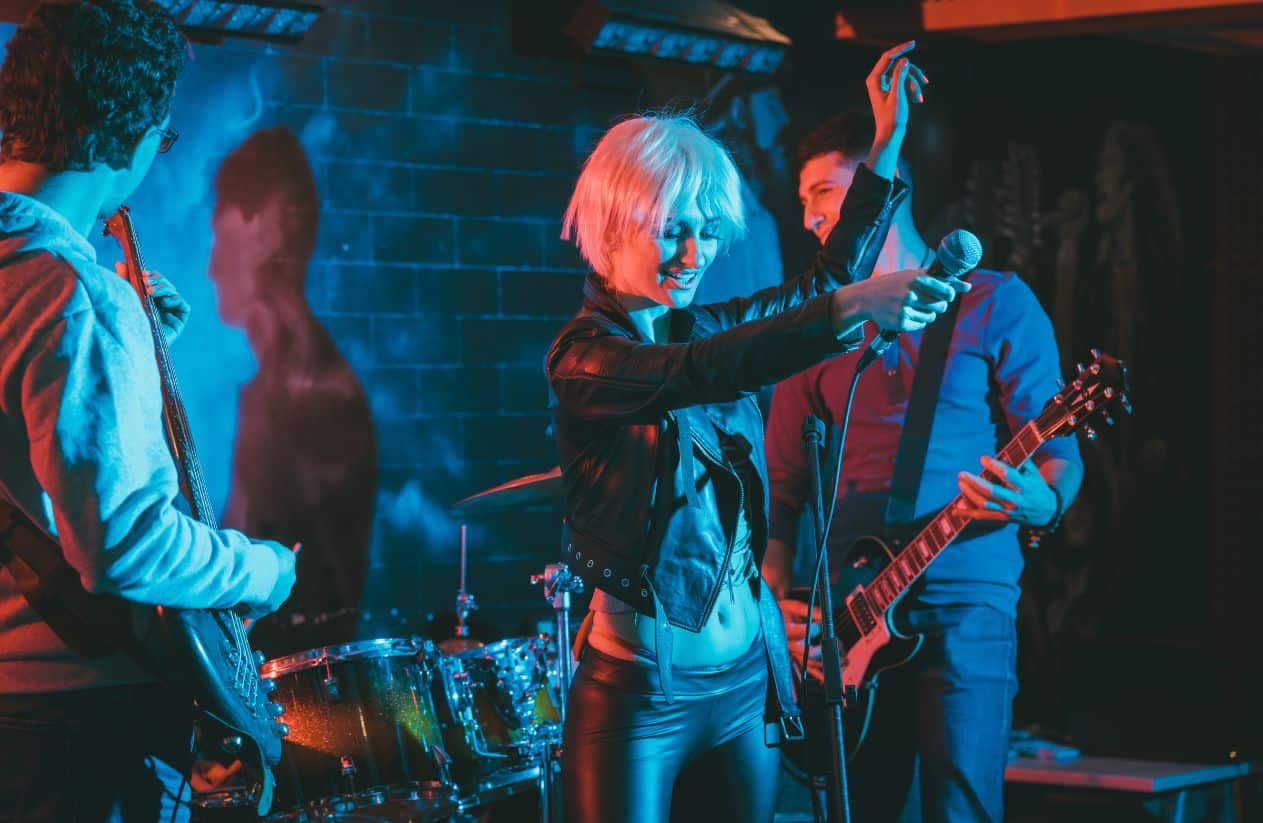Ever felt that electric buzz of a live show, the kind where the crowd’s energy just lifts you?
That’s the magic waiting when you know how to land gigs at colleges and universities. Forget dimly lit bars and half-empty clubs for a second.
Imagine your music booming through a packed student union, every phone in the air, capturing the moment. It’s not just a dream; it’s the reality for those who crack the code of the college circuit. Sure, it’s a world of student budgets, Gen Z trends that shift faster than a TikTok feed, and navigating a maze of campus contacts.
But the reward? Think consistent bookings, a fanbase that explodes overnight, and a paycheck that finally reflects your talent.
This isn’t just another gig guide; it’s your backstage pass to turning college campuses into your personal stage, and your talent into a sustainable career.
Key Takeaways: Your College Gig Playbook
- Know Your Audience: Gen Z values authenticity, diversity, and social consciousness. Tailor your performance and pitch accordingly.
- Craft a Killer Pitch: Highlight your unique selling points, showcase your talent with a compelling EPK and demo reel, and personalize your outreach.
- Build Genuine Relationships: Network strategically with key decision-makers, engage authentically, and nurture long-term connections.
- Navigate the Booking Process: Understand college event timelines, negotiate terms effectively, and handle contracts with care.
- Turn Challenges into Opportunities: View rejections as learning experiences, seek feedback, and maintain a positive attitude.
- Offer Value Beyond Performance: Workshops, masterclasses, and Q&A sessions can enhance your appeal.
- Persistence Pays Off: Consistent effort, strategic networking, and a proactive approach are key to building a sustainable college gig career.
Also Read: Easily Land Your Dream Summer Festival Gig
Understanding the College Landscape: More Than Just Parties

When you think of college gigs, do you picture wild frat parties and homecoming blowouts? That’s just scratching the surface. The college landscape is a vibrant tapestry of events, each offering unique opportunities to showcase your talent.
Think welcome week festivals, where freshers are eager for new experiences; cultural festivals celebrating diversity and heritage; and even academic symposiums seeking engaging speakers or performers.
To truly understand how to land gigs at colleges and universities, you need to grasp the audience. College crowds are predominantly Gen Z—a generation that values authenticity, inclusivity, and social consciousness.
They’re not just looking for entertainment; they want experiences that resonate with their values. So, how do you tap into this dynamic market? Start by diving deep into the culture of each institution.
Explore their websites, social media, and local news to understand their specific interests and event trends. Look for student-run blogs or publications to get a feel for what’s hot on campus. Tailor your pitch to reflect their unique vibe, and you’ll be one step closer to landing that coveted college gig.
Crafting a Killer Pitch: Your First Impression Matters

Imagine you’re an event organizer at a bustling university. Your inbox is flooded with emails from performers, all promising the same thing: a great show.
How do you decide who gets the stage? It boils down to one thing: a killer pitch. This isn’t just about listing your talents; it’s about showcasing how you are the perfect fit for their event.
Start by doing your homework. Dive deep into the college’s culture, their past events, and what’s currently buzzing on campus. Tailor your pitch to reflect this understanding, showing them you’re not just another generic act.
Highlight your unique selling points. Maybe it’s your interactive performance style, your ability to blend genres, or your commitment to social causes. Whatever it is, make it shine.
Your electronic press kit (EPK) and demo reel are your visual resumes. Think high-quality recordings, dynamic visuals, and testimonials that sing your praises. Keep your demo reel concise, focusing on your best moments.
And your EPK? Make it easy to navigate, with clear sections for your bio, photos, videos, and technical requirements.
Here’s a simplified pitch template to get you started:
Subject: [Your Name/Band Name] – Engaging Performance for [College/Event Name]
Body:
“Dear [Contact Person],
I’m [Your Name/Band Name], and I was incredibly impressed by [Specific Event/Aspect of the College]. I specialize in [Your Genre/Style], and I noticed your upcoming [Event Name] would be a perfect fit for my unique blend of [Your Unique Selling Point].
[Link to Demo Reel/EPK]
I’ve attached my EPK for more details, and I’d love to discuss how I can make your event unforgettable.
Thank you for your time,
[Your Name/Contact Information]”
Remember, this is just a template. Personalize it, make it human, and let your passion shine through.
You can also read our article about “Ultimate Guide to Creating a Wedding Band Website That Books More Gigs”
Building Relationships: Networking with the Right People (The Strategic Approach)

Mastering how to land gigs at colleges and universities isn’t just about having talent; it’s about strategically cultivating relationships within the campus ecosystem.
Think of it as constructing a robust network that opens doors to consistent, high-value performance opportunities. Here’s a refined, actionable approach:
1. Strategic Contact Identification:
- Deep-Dive Research:
- Don’t just skim college websites. Delve into student organization directories, event calendars, and departmental listings.
- Utilize LinkedIn to identify event coordinators, student activities directors, and faculty members in relevant departments (music, theater, cultural studies).
- Explore campus publications and online forums to identify influential student leaders.
- Segment Your Contacts:
- Categorize contacts based on their influence and relevance (e.g., high-priority event coordinators, potential collaborators, student influencers).
- Tailor your outreach strategy to each segment.
2. Authentic and Value-Driven Engagement:
- Beyond the Email:
- Attend campus events, even if you’re not performing. This shows genuine interest and provides face-to-face networking opportunities.
- Engage in online discussions on campus-specific forums and social media groups. Offer valuable insights and establish yourself as a knowledgeable resource.
- Personalized Outreach:
- Avoid generic templates. Reference specific events, initiatives, or interests of the contact.
- Demonstrate how your performance aligns with their goals and values.
- Offer to provide value before asking for anything in return, such as free workshops, or promotional materials.
- Building a CRM System:
- Implement a CRM system to track interactions, preferences, and key dates. This allows for personalized follow-ups and relationship management.
- Set reminders for important campus events, deadlines, and follow-up communications.
3. Strategic Social Media Utilization:
- Content That Resonates:
- Create content that showcases your talent and aligns with the college demographic’s interests (e.g., behind-the-scenes glimpses, audience interactions, socially conscious messages).
- Utilize Instagram Stories and TikTok to engage with younger audiences.
- Targeted Hashtag Strategy:
- Research and use relevant campus-specific and event-related hashtags to increase visibility.
- Engage with posts from college organizations and event planners.
- Interactive Engagement:
- Respond to comments and direct messages promptly.
- Host live Q&A sessions or online workshops.
- Collaborate with student influencers to expand your reach.
4. Long-Term Relationship Cultivation:
- Consistent Follow-Up:
- Send personalized thank-you notes after meetings or events.
- Provide regular updates on your work and upcoming performances.
- Value-Added Services:
- Offer to conduct workshops, masterclasses, or Q&A sessions.
- Provide free promotional materials or content for campus events.
- Exceptional Experiences:
- Deliver performances that exceed expectations and create lasting memories.
- Seek feedback and continuously improve your services.
By adopting this strategic approach, you’ll transform networking from a transactional activity into a powerful engine for securing consistent and rewarding college gigs.
Related Content: Engaging Event Concepts for College Students to Elevate Campus Life
Conclusion: Building a Sustainable College Gig Career
Mastering how to land gigs at colleges and universities is more than a short-term hustle; it’s about building a sustainable and rewarding career path.
By understanding the unique college landscape, crafting compelling pitches, and strategically networking with key decision-makers, you’re laying the foundation for consistent bookings and long-term success.
Remember, genuine engagement and delivering exceptional experiences are crucial for building lasting relationships. The college market offers unparalleled opportunities to expand your fanbase, generate reliable income, and connect with a vibrant, energetic audience.
Don’t just dream of performing on college stages—take action. Start building your network, refining your pitch, and pursuing those gig opportunities. The stage is set; it’s time to make it yours.
Overcoming Common Challenges: FAQ and Expert Tips
The path to securing consistent college gigs isn’t always smooth. Here’s how to navigate common hurdles:
How do I find the right contacts?
Dive deep into college websites, student organization directories, and LinkedIn. Attend campus events and network in person. Don’t underestimate the power of social media for connecting with student leaders and event coordinators.
College budgets are tight. How do I negotiate?
Research typical event budgets at similar institutions. Offer flexible packages or tiered pricing. Highlight the value you bring beyond just the performance, such as workshops or promotional support. Be prepared to negotiate, but don’t undervalue your talent.
College contracts seem complex. What should I watch out for?
Pay close attention to clauses regarding payment terms, cancellation policies, technical requirements, and liability. If unsure, seek legal advice. Always ensure that the contract is very clear about who is responsible for what.
How do I handle rejections?
Rejection is part of the game. Ask for feedback to understand why you weren’t selected. Maintain a positive attitude, and stay in contact with the event organizers. Turn rejections into opportunities by building relationships for future events.
Expert Tips:
- Be Persistent: Don’t give up after a few rejections. Follow up, stay engaged, and build relationships over time.
- Provide Value: Offer workshops, masterclasses, or Q&A sessions to enhance your appeal.
- Show Flexibility: Be willing to adapt your performance to the college’s specific needs and budget.
- Build a Strong Online Presence: An updated website, professional EPK, and active social media accounts are essential.
- Create a CRM: Use a simple spreadsheet or online CRM to track contacts and interactions.
- Show Up: Attending campus events in person, shows that you are serious about the college market.






